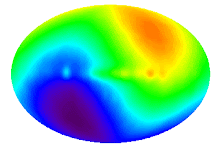Gut Microbiota Host Health
The intestinal microbiota is a complicated
ecosystem that influences many aspects of host physiology (i.e. diet, disease
development, drug metabolism, and regulation of the immune system). It also
exhibits spatial patterning and temporal dynamics.
As the
microbiota is recognized as an entirely separate organ (and containing a
diversity of genes that is at least 100 times greater than the other organs
The
microbiota plays important roles exerting functions essential to the maintenance
of human health and well being, such as stimulation of immune system,
antagonistic effects against pathogens, detoxification of carcinogenic compounds,
fermentation of nondigestible food ingredients and release of a variety of
metabolites involved in the crosstalk between the microbiota and the host. More
than 80% of the species of the dominant intestinal microbiota cannot be
cultivated by the methods available.
The catalog contains 3.3 million non-redundant genes, 150-fold more
than the human genome equivalent and includes a large majority of the gut
metagenomic sequences determined across three continents,

沒有留言:
張貼留言